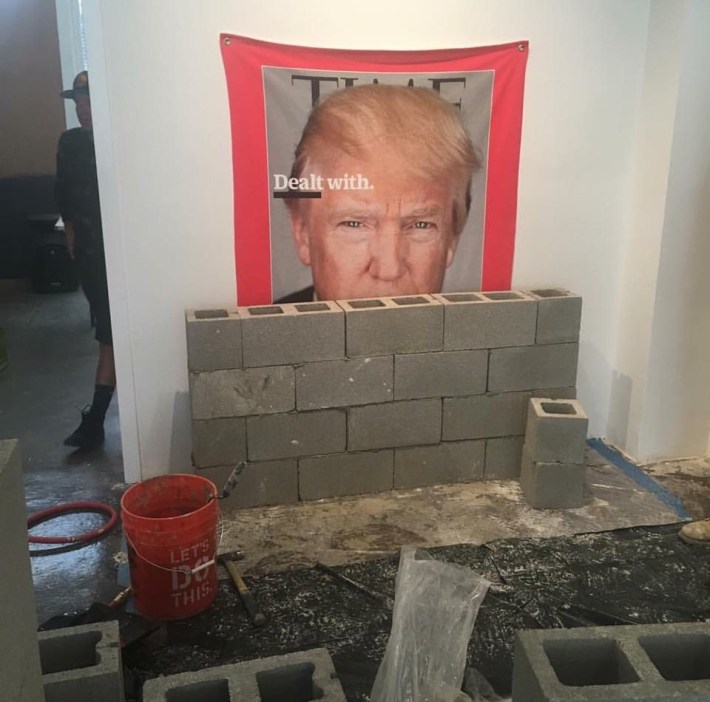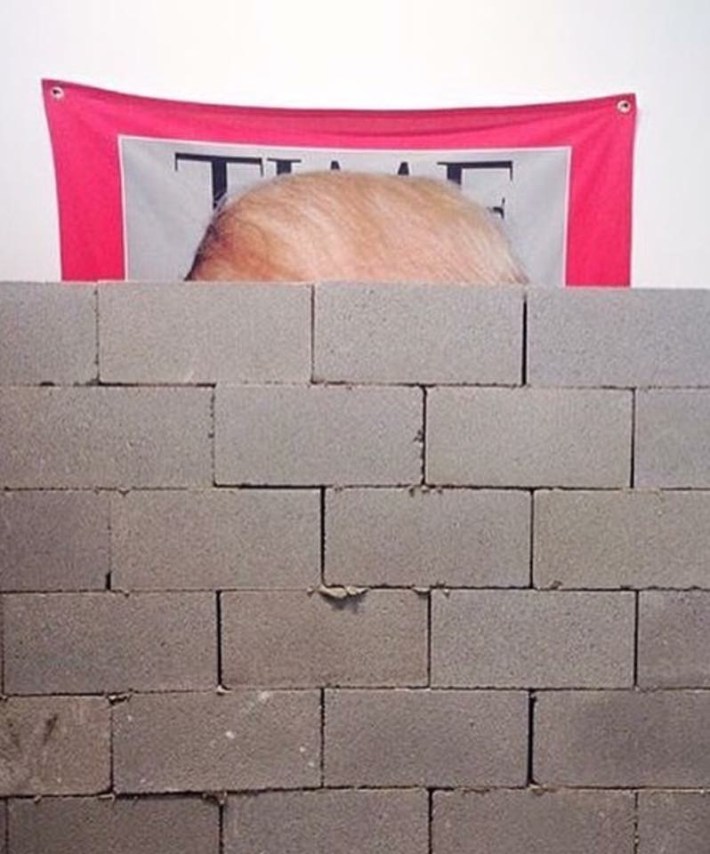original to The Matt Gonzalez Reader, November 7, 2016

Luis Pinto’s installation for “Welcome to the Left Coast” exhibition at the Luggage Store Gallery, San Francisco, May 13, 2016. Curated by Andres Guerrero and Matt Gonzalez.
Build the Wall
by Matt Gonzalez
The 2016 presidential election has been dominated by incendiary rhetoric. In Donald Trump’s case, an early and abiding controversy has been around building a wall on the U.S. — Mexico border and deporting millions of so-called aliens out of our country. The argument, in effect, is that all of our economic woes, or many of them, will be eased as a result. Naturally, progressives are appalled because of how many prospective voters have been lured into this false promise. But I’m not that concerned about the proposed GOP wall, if in fact they win the election, and get to build it. Here’s why.
Cost to build a wall and the resulting impact on food prices
First of all, a wall will prove that Republicans can’t govern. A wall will cost a tremendous amount of money, monies that could better be used to reinforce crumbling infrastructure, and would effectively keep seasonal agricultural workers from entering the United States. The demand for farm workers will push wages up and there will be an immediate rise in food prices.
Conservative estimates are that to build a two thousand-mile concrete fence will cost in the range of $15-25 billion dollars (Kate Drew, “This is what Trump’s border wall could cost US”, CNBC, 10/09/15). While there will be jobs created in the building of such a barrier, these aren’t sustainable long-term jobs. Given that the United States infrastructure has been given a D+ rating by the American Society of Civil Engineers, the question immediately arises as to why such a chunk of money isn’t being spent to upgrade bridges, roads, and water systems. Such urgently needed capital improvements are vital to avoid wholesale collapse of the economy. The base cost estimate to address our massive repair needs is $3.6 billion.
Putting aside tunnels and other possible work-arounds to a barrier wall, what happens when farm workers are unable to enter the United States? The resulting labor shortage will impact the ability of American farmers to plant and harvest to such an extent that the cost of food will escalate. Farmers will need to dig deeper to pay the kinds of salaries necessary to attract American workers to take these jobs, if they can in fact find any willing takers. Previous efforts to encourage Americans to consider this temporary work have failed. It seems seasonal jobs involving long hours in the extreme temperature are a difficult sell. One marketing effort only resulted in 11 takers, even though the “Take Our Jobs” campaign received 86,000 inquries. Agriculture Secretary Tom Vilsak confirms this quandary: “Few citizens express interest [in this kind of work], in large part because this is hard, tough work. (Alicia Caldwell, “Agriculture Industry Fears Disaster If Illegal Immigration Enforcement Program E Verify Is Implemented”, Associated Press, 08/01/11)
Without cheap labor, food prices will skyrocket. The resulting crisis of inflation will lead to a reevaluation of what seems absolutely necessary to control our borders. Needless to say, once the rhetoric washes away, the public will not like paying 2 to 3x as much for a tomato. Not to mention, how consumables inflation will impact the restaurant and chain grocery industries, which have been stalwart supporters of “pro-business” conservatives. I doubt Republicans will win a major election for a generation or however long it takes Americans to forget the disastrous consequences of the GOP blaming immigrants, rather than providing real answers to structural economic inequities. These are inequities which they should answer for on many fronts — from tax policy to military spending — but that’s commentary for another day.
A wall will prevent social conservatives from entering U.S.
A second reason I don’t fear a wall is that keeping immigrants out of the United States will actually only weaken the base of support for values that Republicans hold dear. Immigrants tend to be more conservative in their social and political thinking. They would likely vote for Republicans if they weren’t constantly under attack by them. Christopher Dornan reviewed a recent book by two Canadian researchers Darrell Bricker & John Ibbitson, which found just this phenomenon in Canada, where immigration is widespread. “Immigration policy,” the authors argue, “has produced a new suburban, multiethnic, upwardly mobile and ever-growing category of citizens who want lower taxes, criminals in prison, far less bureaucracy and an iron grip on the public purse strings. Joined with the traditional conservative base and fired by a newly ascendant energy sector, the immigrant fact has tilted the country away from old collectivist concerns and toward an ethos in which free enterprise is unrestricted….” (“How people, not politics, have moved Canada to the right” by Christopher Dornan, the Globe and Mail, Feb. 22, 3013). The GOP is missing its chance to bolster its ranks by constantly singling immigrants out as scapegoats. These newcomers favor the conservative values promoted by Republicans, but they won’t be around to recruit once a wall gets built. So-called conservative family values will further wane.
A wall will protect Mexicans from unfair federal re-entry laws
But the real reason I’m not worried about a wall is that I want to protect Mexicans from inhuman U.S. laws that unfairly punish immigrants, who are simply trying to improve their lives and provide for their families. For the past few decades, the United States has enforced laws that impose gross penalties against immigrants entering the country, who have previously been deported for any and all drug trafficking offense. Major drug trafficking should have consequences. But the federal law includes minor drug sales, including small amounts of marijuana sold to citizens by poor immigrants, as the type of drug trafficking that qualifies for harsh sentencing of up to 20 years in prison. A core principle of justice is that punishments should fit the crime in question. When it comes to immigrants, there is a massive mismatch. No one in Congress has done, is doing, or plans to do anything about this un-American violation of reasonable response.
8 U.S. Code § 1326 works like this. If you get deported for a minor drug offense, no matter how small the sale of contraband was, you qualify for a 20 year federal prison sentence, not for committing a new substantive crime, but merely for reentering the United States. That’s right, entering the country is a felony punishable by a 20 year sentence even if the original minor offense that got you deported didn’t get you a week in jail. With luck, federal prosecutors will sometimes plea bargain these offenses down to 4 or 5 years. That still a hell of a long sentence for just re-entering the country.
Writing for the New York Times, John Schwartz noted (“Immigration Enforcement Fuels Rise in U.S. Cases” Dec 21, 2009) that according to Department of Justice data analyzed by a research team at Syracuse University, immigration prosecutions made up more than half of all criminal cases brought by the federal government. The report noted “The relatively simple cases have become the low-hanging fruit of the federal legal system: Immigration prosecutions, from inception to court disposal, are lightning quick, according to the report. Alternately, white-collar prosecutions take an average of 460 days and narcotics cases take 333. The immigration cases are typically disposed of in 2 days.
“And while federal prosecutors decline to prosecute about half of the white-collar cases that are referred to them by law enforcement agencies, they prosecute 97 percent of the immigration cases, according to the Syracuse group.”
The pertinent parts or the law reads:
8 U.S. Code § 1326 – Reentry of removed aliens
(a) In general
Subject to subsection (b) of this section, any alien who—
(1)
has been denied admission, excluded, deported, or removed or has departed the United States while an order of exclusion, deportation, or removal is outstanding, and thereafter
(2)
enters, attempts to enter, or is at any time found in, the United States,
(b) Criminal penalties for reentry of certain removed aliens
(2)
whose removal was subsequent to a conviction for commission of an aggravated felony, such alien shall be fined under such title, imprisoned not more than 20 years, or both.
The problem is that federal law defines minor drug sales as an aggravated felony. In immigration law, aggravated felony is defined far more broadly than in most state’s criminal laws. The definition is found in Section 101(a)(43) of the Immigration and Nationality Act, or Section 1101(a)(43) of the U.S. Code. Aggravated felonies include murder, rape, the sexual abuse of a minor, kidnapping, a crime of violence where the sentence exceeded 1 year, possession of child pornography, trafficking in firearms or in explosive materials, and the sale of any amount of a controlled substance.
A wall would protect Mexicans desiring to enter this country from laws that equate the sale of an ounce of marijuana with murder, rape, and kidnapping.

Mario Ayala’s painting “A Bigger Pinche Wall” in “Welcome to the Left Coast” exhibition at the Luggage Store Gallery, San Francisco, May, 2016. Curated by Andres Guerrero and Matt Gonzalez.
Mexicans currently fill our federal prisons
As it currently stands, immigrants comprise the largest growing percentage of inmates in our federal prisons. Writing for the BBC Valeria Perasso (“Most foreign prisoners in US are Mexicans – report” April 26, 2011) noted that a recent U.S. Government Accountability Office report found that “almost seven in every 10 foreign prisoners in US jails are Mexicans.”
“Most of the prisoners were convicted for immigration offenses (65%).” Federal Bureau of Prisons statistics (Aug 2015) show that nearly 16% of all federal prisoners are Mexican nationals with the number rising to over 20% when Central and South Americans are included. In total, foreigners make up more than 25% of the U.S. prison population.
How long will it take before Republicans are forced to pass laws inviting Mexicans to enter the country legally to do the work Americans won’t? I’d prefer that we simply correct unjust reentry laws, but there isn’t any movement to do so. If a border wall gets built, Republicans might actually be forced to address the fact that they’re anti immigrant when it suits them (at election time) and then supportive of the free flow of cheap labor when the crops need to be planted and harvested or their kids need to be cared for. So I don’t fear a wall. It’ll actually be a wake-up call for policy makers who will have lost their scapegoats. They won’t be able to throw stones at an entire population of people seeking the same life that nearly every American’s ancestors sought.
Immigrants commit fewer crimes than their citizen counterparts
All of this bellies the faulty premise of why we need a wall in the first place, that somehow immigrants create a crime wave once they enter the country. The truth is that immigrants commit fewer crimes than their U.S.-born counterparts. Numerous studies have reached this conclusion. The Immigration Policy Center found: “Harsh immigration policies are not effective in fighting crime because—as numerous studies over the past 100 years have shown—immigrants are less likely to commit crimes or be behind bars than the native-born, and high rates of immigration are not associated with higher rates of crime. This holds true for both legal immigrants and the undocumented, regardless of their country of origin or level of education.
Mexicans are fleeing extreme poverty
If Republicans continue their anti-immigrant rhetoric, we should combat it with accurate information. Why are Mexicans coming here in the first place? And who bears responsibility for it?
First off, Mexicans are fleeing extreme poverty. Ella Caddy of the Borgen Project, a nonprofit that addresses poverty and hunger issues, estimates that “Around half of the population [in Mexico] lives in poverty; about 10 percent of people live in extreme poverty.” (reported 08/15). What this means in real terms is astounding when compared to conditions in the U.S.:“About 25 million Mexicans make less than $14 a day and a quarter of the workforce is underemployed.”
Mexicans aren’t coming across our borders because they want to be Americans. Mexicans are a proud people who love their country. They are coming here because we’ve undermined their agricultural economy and helped foster a culture of drugs and violence that is causing residents in certain parts of the country to flee. Given that a full 50 percent of Mexicans live in poverty and 10 percent live in extreme poverty, it makes sense that even menial jobs in the United States feel like a last resort. And as the Borgen Project notes there are many indicators that drug wars perpetuate poverty in Mexico.
American policies, including NAFTA, have undermined the Mexican agricultural economy
American domestic policy, specifically the subsidizing of commodity crops, such as soy, corn, and wheat, means that Americans grow food more cheaply than Mexicans can. The American taxpayer is giving American farmers a type of “welfare” that unfairly advantage them against Mexican farmers, who can’t compete.
Many Americans may not realize that our own policies have precipitated a wave of immigration by directly undermining the Mexican economy. According to Timothy A. Wise, Director of the Research and Policy Program at the Global Development and Environment Institute at Tufts University, who carried out a comparison of farm product prices in the U.S.-Mexico trade between 1997 and 2005, Mexico was flooded with agricultural imports exported at prices below production costs. The eight products studied in his research included: corn, soybeans, wheat, cotton, rice, beef, pork and poultry. “All products showed significant increase in exports—from the lowest 159 percent in soybean to the largest in pork exports at 707 percent….An estimated 2.3 million people have left agriculture in a country desperate for livelihoods,” said Wise. The study estimated that the cost to Mexican producers was around $12.8 billion in the nine-year period, more than 10 percent of the U.S.-Mexico agricultural trade value annually. (“Mexican Farmers Affected By Agricultural Subsidies From NAFTA, Other International Agreements” by Susanna Baumann, Huffington Post, July 28, 2014)
Another day we can talk about how these commodity crops are contributing to the costly and tragic epidemic of obesity in this country (which we happily export to others). For now, let’s just mention that with the free trade zone, not only do American farm subsidies displace jobs and opportunities for Mexican farmers and farm workers, but it’s directly linked to the exodus of Mexican farmers from rural areas. Curiously, Canada, which also has a free trade zone with the United States, doesn’t allow subsidized American food to enter their markets. Perhaps Mexico is the one who should be getting tougher with it’s neighbor.
U.S. exports of guns have contributed to the rise of violence in Mexico
But in addition to undermining the agricultural industry in Mexico, the U.S. actions are directly responsible for tons of crime. For all the rhetoric about immigrants who commit crime, the United States actions and policies are largely responsible for escalating crime in Mexico, I’d even go so far as to say we have made certain areas ruled by drug cartels as unlivable. American gun manufacturers, which capitalize by aggressively exporting to Mexican drug cartels, certainly should answer for their role in promoting immigration to the United States. Interestingly, this is a core GOP constituency.
According to [U.S.] Justice Department figures, 94,000 weapons were recovered from Mexican drug cartels in the five years between 2006 and 2011, of which 64,000 — 70 percent — come from the United States. These smuggled firearms are mostly assault rifles and semi-automatic pistols. “In February 2008, William Hoover, Assistant Director for Field Operations of ATF, testified before Congress that over 90% of the firearms that have either been recovered in, or interdicted in transport to Mexico originated from various sources within the United States.” Even if that number is high, we can conclude the number is substantial.
Conclusion:
There are a few takeaways from all of this: First, Americans have played a vital role in creating the environment that makes Mexicans want to flee their country. Perhaps we need to take greater responsibility for these decisions and not just focus our attention on scapegoating and criminalizing the resulting migration to the United States. Furthermore, if we make it harder for Mexicans to enter the United States let’s be clear about what we’re doing. We’ll be creating some pretty big challenges for ourselves including the resulting rise in the price of food. Finally, Mexicans have become the fodder for our prison industrial complex. A border wall will protect them from that system — a consequence that I wholeheartedly support, given how little Democrats are doing to lessen these unfair laws.
When it’s all said and done, I believe Republicans should be the ones to fear the building of a border wall. The intended targets, our Mexican neighbors, will have to overcome the challenges we’ve helped to create in Mexico, but they will manage. Will we?
Whoever wins the election on Tuesday must address these enduring issues.
Matt Gonzalez

Luis Pinto’s completed installation for “Welcome to the Left Coast” exhibition at the Luggage Store Gallery, San Francisco, May 13, 2016. Curated by Andres Guerrero and Matt Gonzalez.
